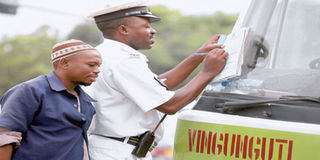Motorists to pay traffic fines via mobile phones

A police Officer writes a traffic ticket against an errant daladala driver in Dar es Salaam . Motorists will soon be able to pay traffic fines through their mobiles phones, and will have up to seven days to do so.
What you need to know:
This means there will be no more cash handouts for traffic policemen. In the new system, traffic police will issue a ticket and the motorist will pay via their mobile money account (M-pesa). The offender will have up to a week to pay up.
Dar es Salaam. Motorists arrested for traffic offences will no longer have to pay the fines on the spot. The Traffic Police Division yesterday signalled that it would be launching a new ticketing system that will allow offenders to pay up at their convenience.
This means there will be no more cash handouts for traffic policemen. In the new system, traffic police will issue a ticket and the motorist will pay via their mobile money account (M-pesa). The offender will have up to a week to pay up. The new strategy means the police and mobile telecommunication operators will work in tandem. When rolled out, the system will save motorists harassment at the hands of the police and also reduce chances of corruption on the road.
The ticketing system will further reduce traffic offences as it will be easy to monitor the behaviour of motorists and the police will no longer be in a position to manufacture flimsy excuses to overcharge or intimidate innocent motorists for non-existent offences.
A pay-bill for the system will be soon rolled out as authorities conclude talks with the mobile firms.
The move has been in the works for a while but the launch has been delayed by technical challenges, according to the Traffic Police Staff Officer, Mr Johansen Kahatano. The electronic payment system will eliminate the paper notification currently in use.
Mr Kahatano, who was speaking during a media workshop on road safety that was organised by the European Union, said traffic police would no longer hold vehicles and motorists would receive electronic notification instead.
“We are keen to start the work, but a few things needed to be sorted out,” Mr Katahano said. “This new system will eliminate a lot of inconvenience for both motorists and the Traffic Police Division.”
The electronic notification will include all the information required and offenders must pay the penalty within a week. Should they fail to do so, they will be hit with a surchage.
The payment could also be made through banks and other electronic transfers to be announced later. It remains to be seen, though, if the initiative will actually reduce police coercion by way of bribes as such deals involve wayward motorists keen to pay up quickly and escape penalties and huge fines.
Tanzania will be joining several other nations where such ticketing systems are already in top gear. Neighbouring Kenya introduced the system in 2012 and has since moved to pegging traffic offences on how far above the set limits offenders have gone.
Most traffic offences in Tanzania attract a Sh30,000 fine. There are 45 offences that a traffic officer can penalise you for. Motorists have often accused traffic officers of harassment when it comes to enforcing the regulations. It may take many hours to pay the fines and more time is wasted in arguments with the officers.
Traffic police are reported to have collected more than Sh100 billion in fines last year alone. The amount could be higher as not each penny paid to the officers is recorded or accounted for.
At yesterday’s training, the Africa Director for Amend, Mr Tom Bishop, said that although Tanzania has signed various agreements on road safety like the Decade of Action for Road Safety in 2010, lack of political continues to hold back the pace at which accidents can be reduced.
Data shows a six percent drop in deaths caused by accidents. For general accidents, this worked out at 30 per cent in 2014. “But this could be much higher if political leaders were truly committed to ensuring road use laws and regulations are implemented.”
Mr Bishop challenged the media to keep highlighting policy shortcomings that contribute to road carnage.




